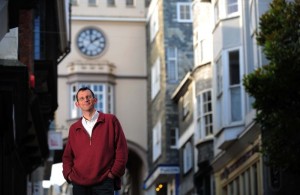This is a pretty complete piece about an oil savvy guy. It is a long piece so go and read the rest.
http://www.energybulletin.net/node/49304
Transition communities gear up for society’s collapse with a shovel and a smile
by Alastair Bland
Cheer Up, It’s Going to Get Worse
Three years ago, David Fridley purchased two and a half acres of land in rural Sonoma County. He planted drought-resistant blue Zuni corn, fruit trees and basic vegetables while leaving a full acre of extant forest for firewood collection. Today, Fridley and several friends and family subsist almost entirely off this small plot of land, with the surplus going to public charity.

HOW DOES YOUR…: Home food production is an ‘entry-level’ survival tactic, says Scott McKeown. (photo: Michael Amsler)
But Fridley is hardly a homegrown hippie who spends his leisure time gardening. He spent 12 years consulting for the oil industry in Asia. He is now a staff scientist at Lawrence Berkeley National Laboratory and a fellow of the Post Carbon Institute in Sebastopol, where members discuss the problems inherent to fossil-fuel dependency.
Fridley has his doubts about renewable energies, and he has grave doubts about the future of crude oil. In fact, he believes to a certainty that society is literally running out of gas and that, perhaps within years, the trucks will stop rolling into Safeway and the only reliable food available will be that grown in
our backyards.
Fridley, like a few other thinkers, activists and pessimists, could talk all night about “peak oil.” This catch phrase describes a scenario, perhaps already unfurling, in which the easy days of oil-based society are over, a scenario in which global oil production has peaked and in which every barrel of crude oil drawn from the earth from that point forth is more difficult to extract than the barrel before it. According to peak oil theory, the time is approaching when the effort and cost of extraction will no longer be worth the oil itself, leaving us without the fuel to power our transportation, factories, farms, society and the very essence of our oil-dependent lives. Fridley believes the change will be very unpleasant for many people.
“If you are a typical American and have expectations of increasing income, cheap food, nondiscretionary spending, leisure time and vacations in Hawaii, then the change we expect soon could be what you would consider ‘doom,'” he says soberly, “because your life is going to fall apart.”
The Great Reskilling
But is it the end of the world?
Fridley and other supporters of the Transition movement don’t believe it is. First sparked in 2007 in Totnes, England, Transition was launched when one Rob Hopkins recognized that modern Western society cannot continue at its current pace of life as fast access to oil begins to dwindle. Global warming and economic meltdown are the two other principle drivers of the Transition movement, but in an ideal “Transition Town,” society would be ready for such changes.
With limited gas-powered transport or oil-based products, a Transition community’s citizens would live within cycling distance of one another in a township built upon complete self-sufficiency, with extremely localized infrastructure for agriculture, clothes making, metal working and the other basics of life which the Western world largely abandoned to factories in the late 1800s, when oil power turned life into a relatively leisurely vacation from reality.
Now, Transitionists say, it’s time to get back to work—and quick. Localized efforts have sprouted from the ground up in Santa Cruz, Cotati, Sebastopol, San Francisco and many other towns worldwide, where residents and neighbors are putting their heads together and collaborating on ways to relocalize themselves, bolster self-sufficiency and build the resilience that communities will need to absorb the shock of peak oil.
Scott McKeown is among several initiators of Transition Sebastopol. A 53-year-old event coordinator by vocation, McKeown believes that as early as 2012 the global economy could founder. “That’s when it’s really going to hit the fan,” he says. “We’re not there yet, but we will be very soon.”
McKeown founded Peak Oil Sebastopol in late 2007 as a public discussion forum for what was then becoming a popular topic of relevance among social reformers. Yet Peak Oil Sebastopol eventually proved a bit too heavy on the talking for McKeown.
“I wanted to shift from a discussion group to an action-based effort,” he explains. “Transition attracted me as a way in which we could actually begin doing something.”
:}
More tomorrow.
:}







 For more about this website and what is all about take a look at the page
For more about this website and what is all about take a look at the page 


